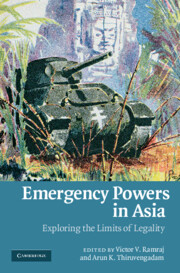Book contents
- Frontmatter
- Contents
- List of contributors
- Preface
- 1 Introduction: emergency powers and constitutionalism in Asia
- PART I Perspectives from legal and political theory
- PART II Postcolonial and post-conflict transitions
- 6 From Myanmar to Manila: a brief study of emergency powers in Southeast Asia
- 7 Discourses of emergency in colonial and postcolonial Burma
- 8 Emergency and Islamic law in Aceh
- 9 UNaccountable? The United Nations, emergency powers and the rule of law in Asia
- PART III Emergencies, executive power and constitutional order
- PART IV The role of the courts
- Index
- References
8 - Emergency and Islamic law in Aceh
from PART II - Postcolonial and post-conflict transitions
Published online by Cambridge University Press: 04 August 2010
- Frontmatter
- Contents
- List of contributors
- Preface
- 1 Introduction: emergency powers and constitutionalism in Asia
- PART I Perspectives from legal and political theory
- PART II Postcolonial and post-conflict transitions
- 6 From Myanmar to Manila: a brief study of emergency powers in Southeast Asia
- 7 Discourses of emergency in colonial and postcolonial Burma
- 8 Emergency and Islamic law in Aceh
- 9 UNaccountable? The United Nations, emergency powers and the rule of law in Asia
- PART III Emergencies, executive power and constitutional order
- PART IV The role of the courts
- Index
- References
Summary
Introduction
Indonesia's province of Aceh on the northwestern tip of the island of Sumatra has been the site of catastrophic natural disaster, as well as the scene of one of Asia's most enduring and bloody armed separatist conflicts. Until August 2005, when an internationally mediated peace process in Helsinki led to resolution of the Aceh conflict, the Indonesian government exercised powers of emergency (darurat) in various forms against the armed separatist Free Aceh Movement (Gerakan Acheh Merdeka, or GAM). These emergency powers included both constitutional and extra-legal measures, and their exercise coincided with measures facilitating the state implementation of Islamic law in Aceh in complex and mutually reinforcing ways. After Indonesia initiated its Reformasi decentralisation process in 1999, the country's political and military establishment called for the concurrent implementation of emergency rule and Islamic law (Shari'a) in the almost entirely Muslim province.
While this particular combination of initiatives to increase the extent of state control may seem surprising to some, it actually has considerable precedent in a number of other countries in which the Islamisation of laws has been promoted within contexts of the exercise of emergency powers since the 1970s. Examples of this type of ‘coincidence’ are numerous and diverse. For instance, under the broader rubric of the exercise of extraordinary powers Anwar Sadat promulgated the 1979 Egyptian Constitution declaring Islamic jurisprudence as the principal source of legislation, while in Pakistan Zia ul-Haq campaigned to make the country an ‘Islamic state’.
- Type
- Chapter
- Information
- Emergency Powers in AsiaExploring the Limits of Legality, pp. 213 - 236Publisher: Cambridge University PressPrint publication year: 2009
References
- 1
- Cited by



